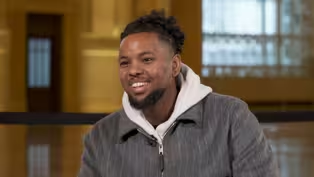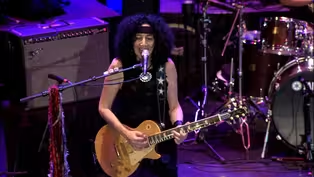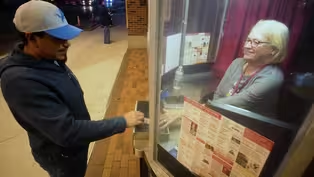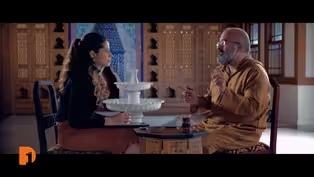
“Islam’s Greatest Stories of Love,” independent movie theaters, Destination Detroit, One Detroit Weekend, Eljuri
Season 10 Episode 8 | 26m 46sVideo has Closed Captions
New film examines love and grief in the Muslim community
This week on One Detroit: We’ll talk with the filmmaker behind a new documentary that examines love and grief in the Muslim community, and we’ll look at how some local independent movie theaters are managing to survive surviving while others have closed. Our “Destination Detroit” series features a local man’s story about why his father moved to the city in the 1980s.
Problems playing video? | Closed Captioning Feedback
Problems playing video? | Closed Captioning Feedback
One Detroit is a local public television program presented by Detroit PBS

“Islam’s Greatest Stories of Love,” independent movie theaters, Destination Detroit, One Detroit Weekend, Eljuri
Season 10 Episode 8 | 26m 46sVideo has Closed Captions
This week on One Detroit: We’ll talk with the filmmaker behind a new documentary that examines love and grief in the Muslim community, and we’ll look at how some local independent movie theaters are managing to survive surviving while others have closed. Our “Destination Detroit” series features a local man’s story about why his father moved to the city in the 1980s.
Problems playing video? | Closed Captioning Feedback
How to Watch One Detroit
One Detroit is available to stream on pbs.org and the free PBS App, available on iPhone, Apple TV, Android TV, Android smartphones, Amazon Fire TV, Amazon Fire Tablet, Roku, Samsung Smart TV, and Vizio.
Providing Support for PBS.org
Learn Moreabout PBS online sponsorship- [Host] Coming up on "One Detroit," we'll talk with the filmmaker behind a new documentary that examines love and grief in the Muslim community.
Plus, we'll look at how some local independent movie theaters are managing to survive while others have closed.
Also ahead, from our "Destination Detroit" series, a Detroit man talks about growing up on the city's east side.
Plus, we'll give you some ideas on what you can do this weekend in metro Detroit.
And we'll end the show with a performance by international singer Eljuri.
It's all coming up next on "One Detroit."
- [Narrator] From Delta faucets to Behr paint, Masco Corporation is proud to deliver products that enhance the way consumers all over the world experience and enjoy their living spaces.
Masco, serving Michigan communities since 1929.
Support also provided by the Cynthia and Edsel Ford Fund for Journalism at Detroit PBS.
- [Narrator 2] The DTE Foundation is a proud sponsor of Detroit PBS.
Through our giving, we are committed to meeting the needs of the communities we serve statewide, to help ensure a bright and thriving future for all.
Learn more @dtefoundation.com.
- [Narrator 3] Nissan Foundation and viewers like you.
(upbeat music) - [Host] Just ahead on "One Detroit," we'll examine the issues faced by some independent movie theaters in southeast Michigan and what they're doing to survive.
Plus, in our "Destination Detroit" series, a local man shares why his father moved to Detroit in the eighties, and we'll close with the sounds of Latina singer and guitarist, Eljuri, from this year's Concert of Colors.
But first up, a new documentary airing on Detroit PBS chronicles the journey of a woman grieving the death of her father.
The film is titled "Islam's Greatest Stories of Love."
It follows Islamic religion scholar Ariella Gayotto Hohl as she travels the world, interviewing Muslims about how their faith and culture enables them to navigate love and grief.
"One Detroit's" Chris Jordan spoke with Gayotto Hohl about the film and her personal journey.
(upbeat music) - You are the host, co-producer, and co-writer of "Islam's Greatest Stories of Love."
Tell me a bit about the film.
- "Islam's Great Stories of Love" is a two-hour film that deals with my personal journey as someone who had lost my father in the middle of a process of trying to understand questions of love.
So the movie's a lot about how do we make sense of love after losing it and after being broken by it?
So we go on this journey with me, which was very fresh.
We started filming only a couple of months after I lost him.
And we were talking to people about these five great stories of love from the Muslim tradition, that really shaped the way that we understand love in Islam.
- What did you find, and how did it help you answer those questions?
- There were two things that are my main takeaways from going on this journey.
The first one is what became also the tagline of the film.
Love is more than an emotion.
It is a force.
How love pushes people to do things that otherwise they wouldn't be able to do.
Maybe the love of a parent that gives them strength, the strength to continue a mission or the strength to be there for each other or to believe in ourselves.
And the second one that I've been thinking a lot about lately too, is that love is not just something that we feel.
It's also a value that we choose to be grounded in every day.
- Tell me a bit about your academic background and kind of how that informed the film, as well as your personal story that you mentioned.
- So I was at Divinity School when all of this started.
So I started my work more focused on Islamic studies in general.
And I wanted to explore these stories that are not so often told within the Muslim community.
And I realized the power of storytelling for others to be able to see themselves and to be able to live their lives more openly and to find legitimacy in the connection with others as well.
So smack in the middle of my, of that work when I was studying, I lost my dad.
And then intellectually, there was a very big shift for me.
I went from looking at things more in the big picture, to exploring these very real questions.
And because my dad was also a photographer, exploring that through a film medium was something that was really special to me personally.
- And within the film, how do you tell these stories?
- So what I love about the way we tell these stories, it's that these are stories that are very obvious for many Muslim audiences.
They are stories that are very much part of our collective memory and our collective understanding of love.
So you have stories from the prophet Khadija, who we still look into and emulate to this day, who really changed the story of Islam through their partnership and through everything they went through together.
We have stories like the Taj Mahal, which is a very common like the people who know about, but what's really special about the way that we tell these stories is that we looked at them specifically from a lens of love and we looked at them from a very personal lens.
So the beauty about the film is that we're getting to tell these stories in a novel way, but because it's so focused on the universal experience of love and loss and grief, it feels very universal at the same time.
- One of the stories that is in the film is the story of Malcolm X and his sister.
And that's a story that's gonna be particularly significant to many viewers here in Detroit, because that story does touch on Detroit and on Lansing where Malcolm X spent time.
- Yeah, it's one of my favorite stories.
And to be honest, it was the one that I was the most surprised about because as much as I know of Malcolm X, as you know, an obvious figure of radical love that really changed the civil rights movement in the US, I never knew about the role that his sister, Ella Collins, had in his life.
So this particular story we tell from the perspective of these two siblings that were there for each other and specifically Ella, his sister's love for him, that allowed him to become the Malcolm X that we know today.
So there is this beautiful bond that we got to explore through the movie and through the conversations that we had, about what is the meaning of unconditional love, of being there for someone, even when you don't believe in the path that they're going, or even when you can see what's ahead of them, but they can't?
And how do we do that in a way that still uplifts them and allows them to be the best version of themselves?
When we start talking about his rise in the Nation of Islam after he's incarcerated, that Detroit becomes the center of his story.
Detroit is really where they have the first temple of the Nation of Islam.
That's where he develops his relationship with Elijah Muhammad.
You know, Detroit is one of the most important cities in the US for Muslims, right?
It's where many of us are.
And I think getting the chance to share something that is in our cultural and religious context with the world in these broader, in this broader lens, I think will be very special.
I think people will get a little bit of a glimpse of what love looks like in our communities, but then also be able to take away some lessons from themselves, for to be able to heal and to understand love in their own way.
- [Host] And you can see the documentary "Islam's Greatest Stories of Love" here on Detroit PBS, tomorrow August 22nd at 9:00 PM.
Let's turn now to the plight of Southeast Michigan's independent movie theaters.
While some movie houses have managed to stay open, others have closed their doors.
One Detroit's Bill Kubota and Chris Jordan teamed up to take a look at some of these historic theaters and their fight for survival.
(upbeat music) - [Chris] On Detroit's east side, the nonprofit, Friends of the Alger Theater, has worked to save their idle movie house for decades, which serves as a community billboard.
- We put on our marquee, messages weekly, right?
And we make enough money from that to pay our water bill and our electric bill.
- [Chris] Alger Friend, Jackie Grant, says this movie house formally showed its last feature film nearly 40 years ago.
She found proof up in the projection booth.
- "Friday the 13th, Part 5" in 1985.
It's right there.
- [Chris] They didn't come back and get the reel, huh?
- Apparently not.
- [Chris] The Alger opened in 1935.
In more recent years, the plan, create a community center and maybe show some movies again, but not likely with these projectors.
- We are in my favorite place.
This is the lobby of the Alger Theater.
I know you're thinking, "It's just a mess," but that's changing as we speak.
- Overhead, the lobby's getting a new roof, but there's so much more work to do.
Meanwhile, on Detroit's northwest side, the Redford, one of the few independent movie theaters in southeast Michigan, is also owned by a nonprofit and has been since the late 1970s.
Here I'm meeting film writer and theater volunteer, John Monahan.
The fight always seems to be like how do you get people to come to a theater, instead of staying at home and watching Netflix and?
- That's been a challenge, you know, about what to show.
And certainly our content has changed quite a bit in the last 20 years as our audience has kind of aged out.
- Thank you.
- Nobody is paid at the Redford Theater.
We're all volunteers.
It is a good business model.
The nonprofit business model is very good for a theater like ours, 'cause it's hard to make money in the theater business.
So it takes a lot of pressure off certainly when you don't have a big payroll.
We really do try to create an experience here as much as as we can, going to the movies like you would've in the 1940s or fifties.
And part of that for a lot of us is the ability to show actual film on film, which we do quite regularly on our old late 1950s Newoco projectors that project both 70 millimeter and 35 millimeter with carbon rods like that make a spark between them like they would've used back in the day.
- Is finding the carbon rods and sourcing those like?
- That's a whole, that's a whole nother element.
Yeah, yeah, those, there's only a finite amount of those around and we're always trying to find somebody who's got a stash of them and sometimes when we do find the carbon rods, they're not exactly the right size.
So I've been stockpiling some of those for trades.
You know, maybe we'll find somebody who needs those and has the ones we need.
- [Narrator 4] This is Radio KSIK.
You've been listening to "Music for Old Invalids."
Our next.
- We, of course, we don't just show 35 millimeter, we have real state of the art digital projection, which looks quite good.
As much of a purist as I am on film, we have really, really nice digital projection here too.
- This is the.
When you enter the Redford, you'll encounter some ways it raises money to keep running.
- Often, people will come over here to the counter where Larry the T-shirt guy designs shirts for the different programs.
We have a 50/50 raffle counter over here where folks walk away with maybe a hundred dollars in cash prizes.
Over here is the wall where we're kind of paying tribute to the famous folks that have been through the theater.
Probably most famously, you know, Bruce Campbell from "The Evil Dead."
He was here.
- And one of the reasons why this theater is iconic to a lot of horror fans is this is, of course, where "The Evil Dead" premiered.
- Yeah, we're really proud of that.
Yeah, the fact that both, the first two "Evil Deads" and the short film that, you know, was that they got seed money to make the feature with.
- [Chris] Yeah.
- Also premiered here.
- Right there.
- And we're also really proud that the more recent horror classic, "It Follows," you know, has its opening sequence that was filmed right here in the theater too.
And we're showing that this year for its 10th anniversary.
- What do you hear from other people who run independent theaters in the state?
Do you talk much with other theater owners?
- That's a good question.
I have great interest in the other theaters that are doing similar to what we're doing.
Certainly the Detroit Film Theater, which is still just so wonderful and the Michigan Theater in Ann Arbor and the Penn Theater and what they're doing, which is also, you know, on that volunteer model.
- [Chris] Mm.
- That's a huge success story the way they were able to save that neighborhood theater and you know, and keep that going.
- Then there's the Senate Theater operating in southwest Detroit, complete with an original organ that accompanied silent films just like the Redford.
When you're hearing those stories of other theaters and what they're doing, how many are continuing to make a go of it as a for-profit and how many are kind of embracing the non-profit model that you guys are?
- Yeah, the nonprofit model seems to be pretty predominant.
I mean, look at the profit model certainly didn't work for the Main Art Theater or the Maple Theater.
You know, both of those are gone, which is really sad.
So hopefully, there'll be something that'll take that, something's gotta take the place of those venues.
- The Howell Theater in Livingston County, another old movie house.
A couple of decades ago, it was split into two screens.
It became the Historic Howell Theater when Toledo Native, Tyler Deperro, bought it 10 years ago.
Tell me a bit about the history of the theater.
You said it's 96 years old?
- Yeah, we turned 96 December 11th of this year.
So it was built in 1927.
It opened December 11th, 1928.
It was the first talkie theater of Livingston County.
The first film that played here was called "Show People," directed by King Vidor.
- "Show People," not a talkie, remains a cinema classic.
Were you scared or apprehensive buying like a small town independent movie theater in 2014?
- Yeah, I mean it's a big, like, totally a big risk.
I moved to Howell, moved to Michigan for the theater.
I mean I had done this research, like making a list of like what makes a good downtown, if that's local shops, walkable downtown, different activities throughout the year.
Having people in the community wanting this movie theater space to reopen.
There isn't like a how to operate a movie theater guidebook and like there isn't a website where you can go and find that out.
So this is theater two.
- [Chris] Deperro's finding ways to better engage the community, find revenue streams by hosting weddings, and other things.
- We've had concerts, improv comedy.
We have church here every Sunday.
- Ah, okay.
- In this theater.
The stage, I'd put in 2014, but the original stage that was here like in 1928, that's actually behind the screen here.
Those vaudeville acts had, you know, performed on when the theater first opened.
You can tap dance a little bit or do a little dance or something.
- I don't think I'll do either of those things.
(Chris laughs) Deperro is getting by in this for-profit enterprise by building a following.
Howell has become a destination for independent moviegoers from places like Lansing, Ann Arbor, and Detroit.
Yeah, well I mean that's definitely how I discovered you guys when you were the only theater in Michigan showing "The Babadook" at first.
- [Amelia] Three sharp knocks.
- The Babadook, dook, dook.
- Yeah, yeah, like that, "The Babadook" like after the movie was done, like when audiences kind of come out and they just talk to like other people in the theater about the movie.
Like that's kind of the other rewarding thing about, it's like when I see a movie at like a chain theater, it's like you just like go in and see the movie and you like leave and there's not really any connection or appreciation or discussion after and yeah, so.
- [Chris] While the historic Howell Theater has its community of film enthusiasts, Detroit's historic Alger Theater engages its community, but that has little to do with the movies.
- Right now we are doing Hope applications with the city for property tax exemption.
So we're doing that good work and we've been doing it for a number of years here.
We've probably put, right now into this building, which the public doesn't really know, close to 500, half a million dollars.
It doesn't show because you don't see plumbing outside.
You don't see electrical.
Those are not the sexy items in any of this.
- [Chris] More money needed, "A few million dollars," Grant said, to keep restoring a place to serve the Morningside, East English Village, and Cornerstone Village Neighborhoods.
Volunteers here, like Redford on the other side of town, just trying to hold onto their historic structures by bringing people together.
- Film especially is a real like a social art.
I think it's sad that people are watching "Casablanca" on their phones.
I think to see it in an auditorium, there's nothing like it.
- Oh, you must be kidding.
- So the event kind of is its own reward.
(dramatic music) - [Host] Turning now to our "Destination Detroit" series, which explores the region's rich history and the people who helped shape it.
Today we hear from Abdul Rahman Abdinur.
He shares how his father moved from New York to Michigan for opportunity.
- Waking up every day and hearing the mosque, the adhan, the call to prayer, and just walking out and that was a normal thing.
And I live in America.
(bright music) So my dad got to Detroit in I would say in the early, early nineties, late eighties.
Originally, he's from Somalia, but he was living in Harlem, in actually Manhattan, New York.
For the most part around that time, my dad was traveling around.
He was a preacher, so he's Muslim.
I'm Muslim, and he would be going to different masjid, mosque, and just preaching the good word.
And when it came to Michigan, he said, "Wow, there's so much Muslim people here, a lot of different mosques here."
And the cost of living was like great.
So he saw opportunity for him to enroll his kids in a Muslim school, and just saw something that he could build on that he didn't have in New York.
And it meant the world to him because at that time, my dad valued his kids getting an education from like a Muslim private school and having a house that he owned with a backyard and a front yard and be able to walk outside and walk to the mosque and go shop at his local store and see people that he's friends with, familiar with, and have that same culture with.
Even though we're Somali, our community was filled with Muslim people, but they're mostly from Yemen, and they're very good people.
So he saw something that he could, you know, build within that community.
I felt like I had the best childhood.
Waking up every day and hearing the mosque, the adhan, the call to prayer, and just walking out and that was a normal thing.
(bright music) - [Host] For more "Destination Detroit stories, go to onedetroitpbs.org/destinationde.
The summer is beginning to wind down, but there are still a lot of outdoor festivals and fairs to enjoy in metro Detroit.
Here's Haley Taylor from 90.9 WRCJ with today's "One Detroit Weekend."
- Hello, I'm Haley Taylor from 90.9 WRCJ, with a roundup of festivals celebrating food, art, and Michigan made magic.
The Taste of Greece Festival continues through August 24th at Nativity Greek Orthodox Church in Plymouth.
Enjoy gyros, baklava, Greek dancing, and warm hospitality.
Downtown Lake Orion hosts the Dragon on the Lake festival through August 24th, featuring an art and craft fair, live entertainment at the Dragon Pub, and the legendary dragon boat races on the water.
In Novi, the Taco Fest takes over 12 Mile Crossing at Fountain Walk, August 22nd through 24th.
It's a spicy mix of taco flavors, tequila tastings, and live music.
And if you're feeling a little rebellious, check out the Plymouth Unfair on August 23rd.
The event is a hyperlocal alternative arts market, just off the beaten path.
Over at Canterbury Village, the Michigan Made Festival happens August 23rd and 24th.
It's a showcase of local creators, artisans, and food vendors all rooted in the mitten state.
And if that's not enough, there are plenty more ways to celebrate summer this weekend.
Stick around for a few more ideas.
(upbeat music) - [Host] That'll do it for this week's "One Detroit."
Thanks for watching.
We'll leave you now with a performance from this year's Detroit Concert of Colors, which features music from around the world.
Here's award-winning, Ecuador born singer-songwriter and guitarist, Eljuri.
(upbeat music, singing in foreign language)
Video has Closed Captions
Clip: S10 Ep8 | 1m 43s | Detroiter Abdulrahman Abdinur participates in One Detroit’s “Destination Detroit” series. (1m 43s)
Latina singer and guitarist Eljuri performs in this year’s Concert of Colors
Video has Closed Captions
Clip: S10 Ep8 | 3m 8s | Detroit PBS’ “Best of Concert of Colors” features Ecuador-born singer, songwriter and guitarist Elju (3m 8s)
Local independent movie theaters finding new ways to stay open
Video has Closed Captions
Clip: S10 Ep8 | 9m 28s | One Detroit’s Chris Jordan and Bill Kubota visit some of metro Detroit’s remaining movie theaters. (9m 28s)
New documentary “Islam’s Greatest Stories of Love” explores how to heal after losing love
Video has Closed Captions
Clip: S10 Ep8 | 6m 18s | One Detroit’s Chris Jordan spoke to Ariella Gayotto Hohl about making the film (6m 18s)
Things to do around Detroit this weekend: August 22, 2025
Video has Closed Captions
Clip: S10 Ep8 | 1m 49s | The Dragon on the Lake Festival, Novi Taco Fest and other fun events happening around Metro Detroit (1m 49s)
Providing Support for PBS.org
Learn Moreabout PBS online sponsorship
- News and Public Affairs

Top journalists deliver compelling original analysis of the hour's headlines.

- News and Public Affairs

FRONTLINE is investigative journalism that questions, explains and changes our world.












Support for PBS provided by:
One Detroit is a local public television program presented by Detroit PBS




